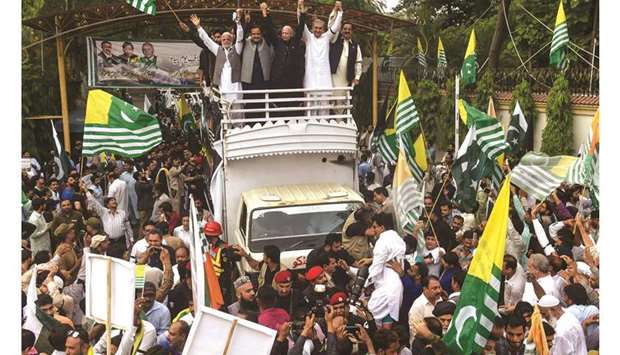At least three Pakistani soldiers were killed in an exchange of fire with Indian troops in Kashmir yesterday, the Pakistani army said, at a time of peak tensions in the disputed border region.
Indian troops fired artillery across the Line of Control (LoC), a de facto frontier that divides the Himalayan valley into parts controlled by the two countries, the Pakistani army said in a statement.
“In efforts to divert attention from precarious situation in IOJ&K (Indian-administered Kashmir), Indian Army increases firing along LOC. 3 Pakistani soldiers embraced shahadat (martyrdom). Pakistan Army responded effectively,” the Pakistani military said in a statement.
It also claimed that “5 Indian soldiers (were) killed, many injured, bunkers damaged. Intermittent exchange of fire continues”, without specifying further where the incident took place.
Pakistani troops killed five Indian soldiers in retaliatory fire, the army claimed, but media reports quoted army officials in New Delhi denying deaths on their side.
An Indian army spokesman told the Press Trust of India late yesterday that the Pakistan claims were “fictitious”, adding that the army was on high alert to deal with any “misadventure” by Pakistan.
Indian defence ministry spokesman Lieutenant-Colonel Devender Anand accused Pakistani troops of “unprovoked mortar shelling and firing”.
“The Indian army retaliated befittingly,” he told the Indian Express, adding that the firing stopped around 5.30pm (1200 GMT) and no casualties were reported on the Indian side.
Police in Pakistan-administered Kashmir said two civilians were also killed in what would be the first clash since New Delhi stripped Indian-administered Kashmir of its special autonomy last week.
A police official, Mirza Arshad Jarral, said that intermittent exchanges of fire between the two militaries had been going on since morning.
The Indian decision on Kashmir and a subsequent security lockdown on the region has triggered a fresh wave of tensions between the South Asian rivals, who have fought three wars in the past.
Both Pakistan and India control only parts of Kashmir, but each lays claim to the entire region since the countries gained independence from Britain in 1947.
Meanwhile, tens of thousands of people angered by the Indian decision to alter the status of Indian-administered Kashmir rallied across Pakistan as Islamabad called for the Indian Independence Day yesterday to be observed as a “Black Day”.
The protesters were carrying black flags, banners and placards with slogans slamming Indian Prime Minister Narendra Modi.
There were also rallies in major cities in Pakistan-administered Kashmir, where members of families divided by the Line of Control marched to condemn Modi and the end to Kashmir’s special status.
Islamabad has reacted to New Delhi’s move by downgrading diplomatic relations with India, halting bilateral trade and suspending all cross-border transport links.
Prime Minister Imran Khan on Wednesday accused India of planning to attack a part of Kashmir administered by his country, warning New Delhi of a tit-for-tat reaction.
He vowed that the time had come to teach Delhi a lesson and promised to “fight until the end” against any Indian aggression.
The prime minister has likened India’s moves in Kashmir to Nazi Germany, accused them of ethnic cleansing, and appealed to the international community to take action.
Yesterday supporters of the Hizbul Mujahideen militant group were among more than 1,000 people who marched through Muzaffarabad, capital of Pakistan’s region of Azad Kashmir, holding black flags and shouting anti-India slogans.
“As long as India continues its occupation of Kashmir, we will fight within the occupied territory, with full force,” Hizbul Mujahideen’s deputy commander, Saifullah Khalid, told the crowd. “Until the eviction of the last Indian soldier, our armed struggle will go on.”
India has banned Hizbul Mujahideen as a terrorist outfit, which it has long said Pakistan funds, along with similar groups.
Islamabad denies this, though it does not ban the group.
Newspaper issues carried black borders and politicians, including Prime Minister Khan, replaced their social media pictures with black squares. Flags on government buildings flew at half-mast.
Pakistan’s largely symbolic ‘Black Day’ comes amid growing frustration in Islamabad at the lack of international response over the Kashmir dispute.
Pakistan was isolated diplomatically and faced “a world in denial” over the situation in Kashmir, Dawn, the country’s most influential English-language newspaper, said in an editorial.
The 15-member United Nations Security Council could discuss the dispute soon, but Pakistan says it only has guaranteed support from China, which also claims part of India’s Jammu and Kashmir state.
Permanent security council member Russia said on Wednesday that it supported India’s stance that the dispute should be resolved through bilateral means, while the United States has called India’s decision an internal matter for New Delhi.
Earlier this year Pakistan and India came close to all-out conflict yet again, after a militant attack in Indian-held Kashmir in February was claimed by a group based in Pakistan, igniting tit-for-tat air strikes.

Foreign Minister Shah Mehmood Qureshi and other party leaders take part in a rally in Lahore yesterday against India, as the country observes ‘Black Day’ on India’s Independence Day over the recent move to strip Indian-administered Kashmir of its autonomy.
